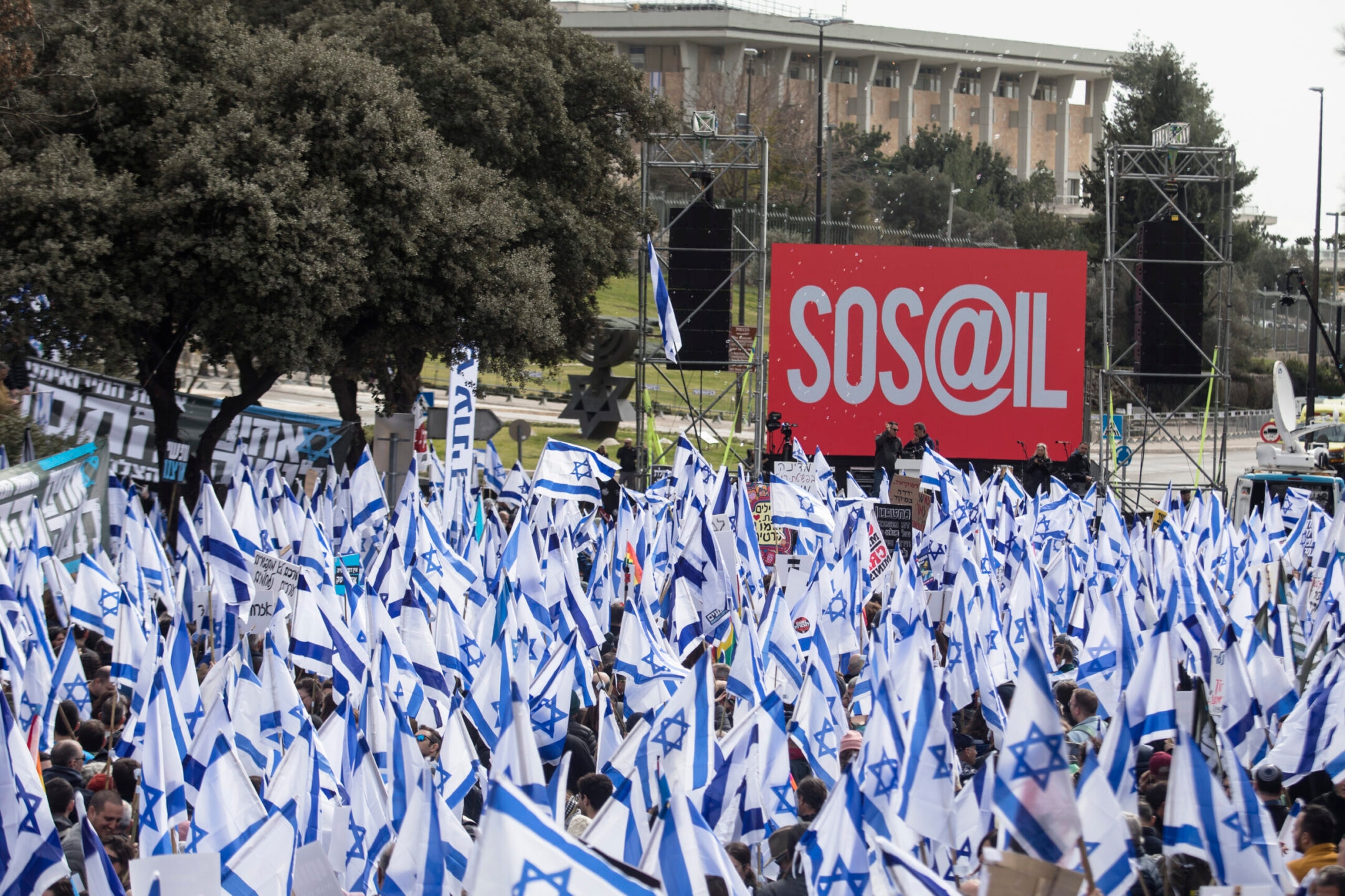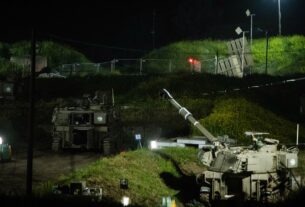If it feels like there’s an overload of news out of Israel — a sea of flags at a Jerusalem protest, police sirens outside of a synagogue — that’s because there is. Israel has been consumed by two escalating crises that both appear to be crescendoing at the same time. And even though they feel separate, they’re intertwined in at least one big way.
Allow us to explain:
Israel is simultaneously contending with two things: a wave of Palestinian terror attacks and Israeli military raids in the West Bank, and massive protests of a government plan to constrain the courts. Each of these two news stories is significant by itself, and would likely command the world’s attention if it were happening alone. But it’s not exactly a coincidence that they’re happening together.
What is happening right now?
The Israeli news that has captured the world’s notice over the past few weeks — and drawn criticism from President Joe Biden — is the ongoing right-wing effort to sap the power of Israel’s courts. The Israeli government that took power in December wants to take control over the appointment of judges and effectively remove the Supreme Court’s ability to strike down laws. Backers of the plan say the courts have essentially become an instrument of the country’s left-wing minority, leaving the right-wing majority unable to pass laws and govern.
But one poll found that just a quarter of Israelis support the plan in its current form, and hundreds of thousands have taken to the streets in protest. Satellite protests have sprung up in cities outside of Israel, organized by people who oppose Israeli Prime Minister Benjamin Netanyahu due to his ongoing trial for corruption.
Observers warn that the court reform will remove a key element of what makes democracies democratic — the separation of powers between the executive and judicial branches. Entrepreneurs in Israel’s tech sector are pulling their business out of the country in protest of the decision.
Nevertheless, in the face of a 100,000-person protest in Jerusalem on Monday, the government pushed the plan forward — though it has also signaled that it’s open to negotiations over the proposal.
Alongside the social unrest, a series of violent attacks have shaken the West Bank and eastern Jerusalem. Two Friday attacks by Palestinians in Israeli eastern Jerusalem neighborhoods — one in late January and one on Feb. 10 — killed 10 civilians, including three children.
The homes of the perpetrators will likely be demolished, and in response to the attacks, Israel authorized nine settlement outposts it had previously considered illegal. The United States condemned the decision.
On Monday, an Israeli border police officer died after being stabbed by a 13-year-old Palestinian and then being hit with friendly fire from a security guard. It’s the latest in a string of attacks by teenagers.
Those attacks have taken place against the backdrop of Israeli military raids in the West Bank that have killed dozens of Palestinians. According to Israel and its supporters, the dead are almost entirely militants. But last month, two civilians were killed in an Israeli raid on the northern West Bank City of Jenin that saw 10 total fatalities. Several teenagers have also been among the Palestinians killed. On Saturday, an Israeli settler shot and killed a Palestinian man following an altercation.
And this week, violence in the West Bank again received global attention when a staff writer for the New Yorker filmed an Israeli soldier beating a Palestinian activist in Hebron. The soldier was jailed for 10 days.
Are these two stories connected?
No, and yes.
On one hand, one of these stories is legislative and the other concerns the Israeli-Palestinian conflict. The street protesters are, by and large, not coming out in opposition to Israel’s policies in the West Bank — and the Palestinian attackers almost definitely aren’t motivated by an opposition to judicial reform.
But on the other hand, both the judicial reform and the escalation are taking place under the watch of Netanyahu’s new government, the most right-wing in the country’s history. The same right-wing factions that are trumpeting the judicial reform are pushing for a harsher and more widespread crackdown on the Palestinian attacks — and looser rules of engagement for soldiers. Meanwhile, the same Supreme Court that the government wishes to restrain also rules on the legality of certain counterterrorism measures — including the demolition of attackers’ homes.
Finance Minister Bezalel Smotrich, whose Religious Zionism party is leading the charge on constraining the courts, also tweeted on Monday that teenage Palestinian attackers “blossom in a violent and inciting society that brainwashes them with hatred of Israel.” He called on Israel to “exact a heavy price” for such incitement. His ally, far-right National Security Minister Itamar Ben-Gvir, protested the military’s decision to punish the soldier who beat the Palestinian activist.
“I support the soldier who didn’t stay quiet with all my strength,” Ben-Gvir tweeted. “Soldiers need to receive support, not jail time.”
Is there going to be another intifada?
The second intifada — in which a series of Palestinian terror attacks in cafes, buses and other public spaces in the early 2000s killed approximately 1,000 Israelis — traumatized a generation of Israelis. Israeli retaliatory measures during that time killed thousands of Palestinians, and since then, hopes for peace have faded.
There have been waves of terrorism in the intervening decades, though none as intense as the intifada 20 years ago. It is too soon to tell whether attacks will rise to that level, though the violence does not appear to be ending anytime soon. According to Israeli reports, Palestinian terror groups are encouraging teenagers to carry out attacks on Israelis.
And members of Israel’s government are agitating for an escalation of counterterror measures in ways that recall Israeli actions during the intifada. In 2002, in response to the terror attacks, Israel launched Operation Defensive Shield, which saw Israeli soldiers enter Palestinian population centers in the West Bank to root out terror groups. Following Friday’s terror attack in Jerusalem, Ben Gvir proposed “Defensive Shield 2.”
“I am determined to bring about Defensive Shield 2 in Jerusalem,” he tweeted, pledging to “demolish illegal buildings, to arrest more than 150 targets and to spread out across the houses, to stop the incitement in the mosques, to stop those who owe tax money and much more.”
Is Israeli society collapsing?
Fears of a societal break are growing, and even President Isaac Herzog warned of looming disaster. Herzog, whose role is largely ceremonial, gave a landmark speech on Sunday begging for negotiations and compromise over the judicial reforms.
“For a while, we have no longer been in a political debate, but are on the brink of constitutional and social collapse,” Herzog, a former leader of the Labor opposition party who once ran against Netanyahu, said early in the speech. “I feel, we all feel, that we are in the moment before a clash, even a violent clash. The gunpowder barrel is about to explode.”
In response, the government delayed part of the bill’s legislative advance, but it remains to be seen whether there will be meaningful negotiations over its content. In the interim, Israelis are broadcasting fears of civil war. On Tuesday, former Prime Minister Naftali Bennett, an opponent of Netanyahu, shared a video from a Jewish think tank announcing a societal dialogue initiative.
Over the melody of Israel’s national anthem, the video reviews past moments of societal rupture — among them the assassination of Prime Minister Yitzhak Rabin in 1995, and Israel’s withdrawal from Gaza a decade later — and then says, “February 2023: We did not begin a civil war.”
Netanyahu has responded to the protests by decrying calls for violence, accusing his opponents of fomenting anarchy, and calling for calm. But in a speech on Sunday, he reiterated that his government won a majority and intends to legislate accordingly.
“This government received the trust of the people in democratic elections, and a clear mandate from Israel’s citizens,” he said. “No one here can doubt that.”
It’s hard to say what the future will hold, but it’s clear that this moment has the potential to transform into something more dangerous than what has already taken place.




